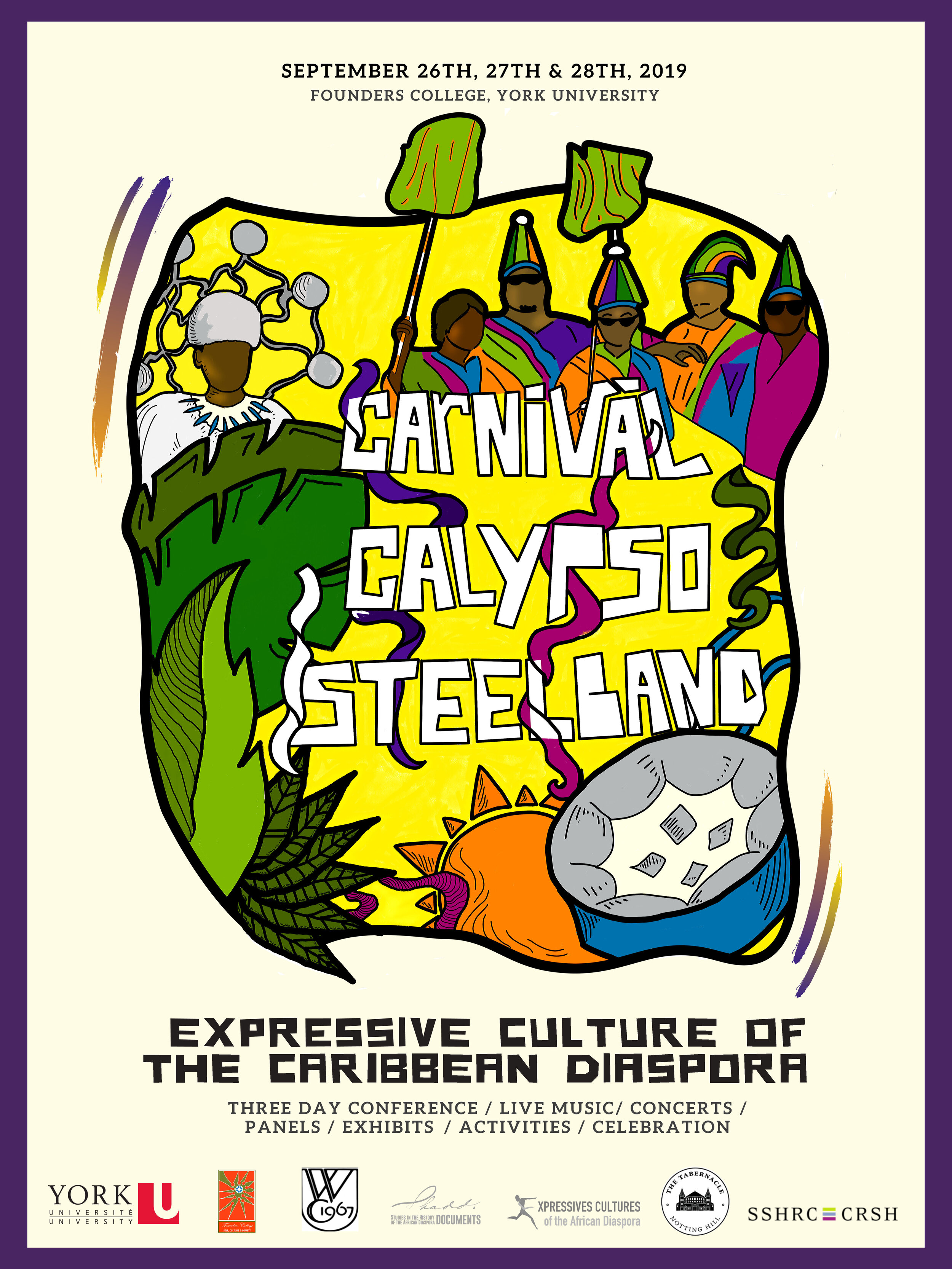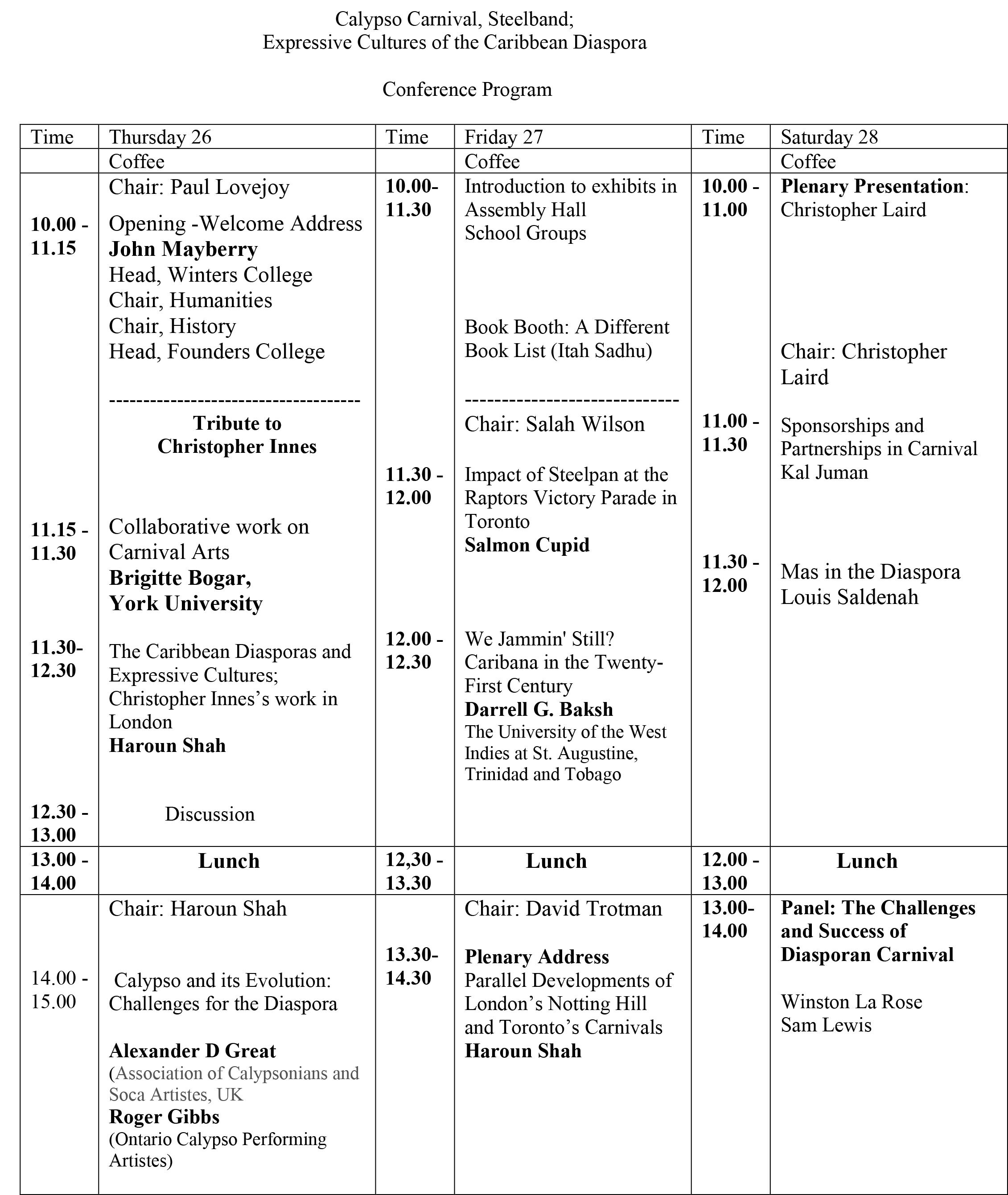Calypso Carnival & Steelband - Expressive Cultures of the Caribbean Diaspora
Founders College, York University Canada
September 26-28, 2019
A Tribute to the late Christopher Innes
The performance of ‘Esso Tripoli Steelband’, Trinidad and Tobago’s representative of the nation musical heritagefor Canada’s centennial celebration ‘Expo 67’ in Montreal was a watershed moment in North American culture and arts. Canada's Caribbean community responded with Toronto’s Caribana which soon rose to become North America’s largest street festival. Caribbean carnivals in New York, Toronto (Caribana) and London (Notting Hill) each attract around 2-3 million people annually and net hundreds of millions of dollars/pounds into their respective economies. A commonality between these events is a cultural legacy that is born out of slavery and diversified with the arrival of indentured labourers. The branded name ‘Caribana’s is the envy of many as it is so unique that it became a global phenomenon that was soon immortalised in “Toronto Mas” by the legendary Mighty Sparrow. However, behind these monumental events, the motivation for authenticity and success were doggedly driven by the innovativeness of the tireless and dedicated artists of the diaspora. Many gave up their fulltime jobs to devote their careers as perfectionists to this artform and the City rose to meet their aspirations.
The Toronto carnival route took centre stage and was proudly channelled through the heart of Toronto on a busy Saturday morning; starting from Bloor and Yonge Streets passing by Toronto’s City Hall and ending up with a concert at Nathan Phillips Square. Spectators lined the route and cheered as they did in Trinidad and occasionally joined the bands for a ‘jump up’ that characterises a street parade. But it was a victim of its own success and soon started to decline as the route began to shrink and was eventually taken out of the city to its outskirts. While the City is reserved for parades such as Pride and other Festivals, Caribana today stands as a mere shadow of its past glory on a very compact diminutive route along Lake Shore Boulevard into Exhibition Place. Here, bands are subjected to a paid concert-like performance in a stadium and even after its brief street parade, barricades are used to keep out the very spectators who created this global phenomenon.
Frustrated by the direction Caribana was being pushed, the late Professor Christopher Innes held Canada’s first carnival conference in 2008 titled “Carnival, A People’s Art’ and ‘Taking back the Streets’at York University, July 31 - August 3 to coincide with Caribana. Visitors from around the world witnessed first-hand many of the unfortunate changes and aired their views through this conference. Professor Innes reiterated his exasperation with Caribana and the loss of its identity at the UK’s Steelpan Conferences between 2010 to 2016. The 7thbiennial steelpan conference in London in 2018 ( https://www.steelpanconference.com/)was dedicated to him through presentations by Professor Paul Lovejoy and Dr. Érika Melek Delgado of The Harriet Tubman Institute, York University. Another project initiated by the late Prof. Innes was to digitise the Mas band and costumes of the late Kenn Shah, a Caribana pioneer who passed away in 2002 and to whom Caribana was dedicated to that year. This project, based on archives from his family, is in progress by current university staff and will also be reported at this meeting.
In recent years, the Caribbean community began declaring their disappointment by staying way en massduring ‘Caribana’. However, there were indications of improvements in 2019 and gives reason for optimism. Join us for three days of discussion and concerts at York University that intend to explore the tradition of expression that has electrified crowds in the Caribbean, the United States, Central America, Canada and England. What are the origins of the carnival tradition? What have been the major influences on the development of carnival in different locations? How has the public been involved in carnival expression? How have government authorities responded to the spontaneity of carnival? How has calypso as a style of music influenced community and identity.
This conference will draw on the experience of carnivalists, academics, students and enthusiasts to discuss pathways to reinstate Caribana as a global tour de force. Speakers from the USA (Prof. Andrew Martin), UK (Prof. Haroun Shah, the former UK’s Calypso Monarch, Alexander D Great,Érika Melek Delgado), Trinidad (Dr. Rudolph Ottley, Nestor Sullivan, Dr. Darrell Baksh), Costa Rica (Paul Lovejoy, Manuel Monestel) and a host of renowned artists from Canada such as Salah Wilson, Salmon Cupid, Roger Gibbs, Louis Saldenah, Ian Jones, Wayne Donawa, Ronald Shah, Kal Juman, Winston La Rose, Sam Lewis, Denise Challenger, Dadrien Brown, Tamika Johnson, Bruno Versa, Nikoli Attai and York’s ‘Trinidadian’ professors, Christopher Laird and David Trotman are among the main presenters. The meeting will be opened by the head of Winters College, Prof. John Mayberry and the tribute to the late Christopher Innes will be given by his wife, Dr. Brigitte Bogar (York University) who has worked both independently and with Prof. Innes on numerous projects including the 2008 conference and subsequent book, “Carnival: Theory and Practice”, (2012). (see York University Obituary; http://yfile.news.yorku.ca/2017/06/21/passings-christopher-innes-remembered-as-one-of-yorks-stars/).
Fresh from the success of the Notting Hill Carnival 2019, organizers in Toronto and London are hosting this meeting to address some of the recurrent problems, explore solutions based upon experiences from both sides of the Atlantic to ensure that these events, which represent more than 5 decades of work by the diaspora, are conserved for generations to come. The Conference/Exposition features panel discussions on the origins, achievements and current state of these art forms, relationships with state and community and the expositions would feature discussions on prospects for the future with a focus on the ongoing projects for documentation.
The conference requires no prior registration and is entirely free. All events between 26-28thSeptember will take placeatFounders College at York University, 4700 Keele St, Toronto, Ontario M3J 1P3. The Subway is York University. The conference runs between 10am to 5pm daily with evening concerts at the end of each day. For further information please contact: Bruno Veras De Morais E Silva - Email: brunorv@yorku.caor simply turn up and register on site.










